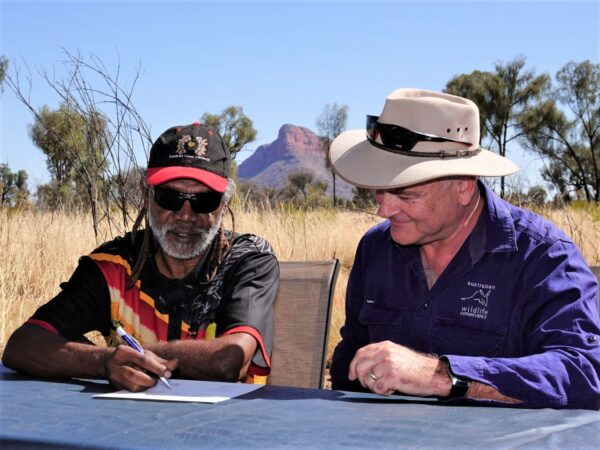
An exciting new partnership in Central Australia between the traditional owners of the Ngalurrtju Aboriginal Land Trust, Central Land Council and Australian Wildlife Conservancy sees more than 300,000 hectares brought under conservation management
Alice Springs, NT, Thursday 12 May 2022 – The traditional owners, the Central Land Council (CLC) and Australian Wildlife Conservancy (AWC) have signed an agreement to collaboratively promote the conservation of the unique cultural and ecological values of the land trust in the Northern Territory.
Building on long-standing and productive relationships between the Warlpiri, Anmatyerr and Luritja -speaking traditional owners, the CLC and AWC, this new collaboration – the Ngalurrtju partnership – will provide exciting opportunities for mutual learning through the sharing of Aboriginal cultural and ecological knowledge, conservation land management practices and scientific research methods.
“We look forward to working on our country with the CLC and AWC, to protect our sacred sites and look after all the plants and animals,” said Nigel Andy, from the Karrinyarra traditional owner group.
The land trust features many sites of great cultural and spiritual importance. A major ngapa (water) songline travels right through the middle.
CLC chief executive Les Turner said the agreement between the CLC and AWC would provide for strong protection of these sites and included an employment package of approximately $170,000 per year.
“The package will create employment and training opportunities for the members of four estate groups and their communities,” he said. “All these groups will be represented on the partnership’s steering committee, ensuring the area will be managed in line with the traditional owners’ cultural knowledge and obligations.”
The 323,000 hectare land trust in the Great Sandy Desert bioregion at the edge of the Tanami Desert straddles the transition zone at the junction of three arid zone bioregions. It adjoins AWC’s 262,000-hectare Newhaven Wildlife Sanctuary.
Together these two properties will protect almost 600,000-hectares of exceptional conservation value.
Central Australia’s biodiversity is under threat from feral cats and foxes, altered fire regimes, feral camels, cattle, horses and weeds. Tim Allard, the Australian Wildlife Conservancy’s CEO, anticipates that the partnership will see these threats controlled and biodiversity restored on a landscape scale.
“AWC is working to extend its innovative Indigenous Partnership model by forming a new partnership with the Ngalurrtju traditional owners and the CLC. Together we will be establishing a template for collaborative conservation in Central Australia.”
The adjacent Newhaven Wildlife Sanctuary has been effectively managed for conservation for more than two decades.
At Newhaven, AWC has worked with Luritja and Warlpiri-speaking rangers and native title holders for more than 15 years on conservation programs ranging from biodiversity and targeted threatened species monitoring to active land management programs such as fire management and feral animal control.
Science informs all of AWC’s on-ground conservation actions and an extensive science program will be implemented at Ngalurrtju, including monitoring of threatened and culturally important species and ecosystems.
The partnership will complement and extend the work on Newhaven in collaboration with the CLC’s Warlpiri and Anangu Luritjiku rangers and AWC’s Ngalurrtju and Newhaven Warlpiri rangers.
Recording and mapping threatened and culturally important species and ecosystems and building an inventory of extant plant and animal species will be early priorities. This important process helps to identify threatening processes and informs the development of a culturally-based conservation land management program and ‘healthy country’ planning.
The partnership will help to secure populations of some of Australia’s most threatened species, deliver positive cultural and socio-economic outcomes for traditional owners and provide a best-practice template for collaborative conservation in Central Australia.
Follow links for more information on the Central Land Council’s and the Australian Wildlife Conservancy’s work.
